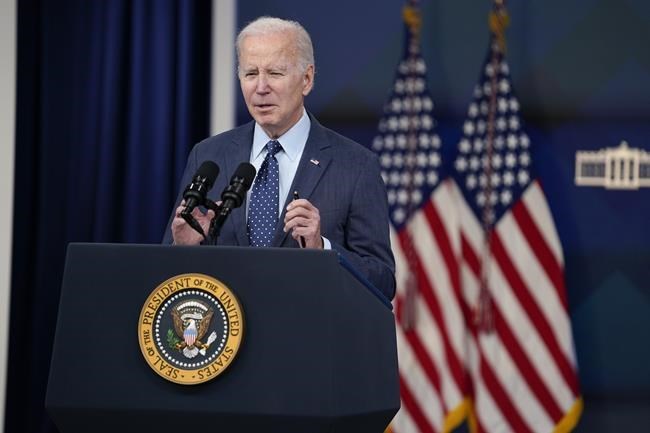WASHINGTON — The three mysterious objects shot down over the U.S. and Canada earlier this month were likely no danger to national security, President Joe Biden said Thursday as he promised new rules to better govern the continent's crowded skies.
Biden, addressing the nation on live television amid mounting political pressure to do so, defended the decision to down the still-unidentified objects because of the very real risk they posed to commercial air traffic.
He acknowledged the role the binational North American Aerospace Defence Command, known as Norad, and the federal government in Ottawa played as the mysterious saga developed over a three-day period through last weekend.
And he said the prevailing theory among U.S. intelligence officials right now is that the objects were likely privately owned, perhaps linked to academic research, corporate endeavours or even recreational activity.
"We don't yet know exactly what these three objects were, but nothing right now suggests they were related to China's spy balloon program, or (that) they were surveillance vehicles from any other country," Biden said.
"The intelligence community's current assessment is that these three objects were most likely balloons tied to private companies, recreation or research institutions, studying weather or conducting other scientific research."
The federal government in Ottawa has not yet gone that far, urging Canadians to wait for an analysis of the wreckage from Yukon and Lake Huron — assuming any can be recovered — before drawing any conclusions.
"Temperatures are, you know, rock-bottom freezing, very low and they’re in remote locations. And that applies equally to Lake Huron," Public Safety Minister Marco Mendicino said Wednesday.
"There’s a possibility that we won’t be able to recover them, given their remoteness, given the challenges, given the deterioration, etc. But rather than speculate, let’s first try to get a look."
Politico and Aviation Week reported Thursday that a group of hobbyists — the Northern Illinois Bottlecap Balloon Brigade — lost track of a hydrogen-filled balloon off the Alaskan coast early Saturday morning, the same day an object was shot down over Yukon.
At a news conference Thursday in the Bahamas, Trudeau would not say if Canada has come to any conclusions about the three objects, but did insist that downing them was the right decision.
"We will be working with our American partners on protection of North American airspace. This is something that every step of the way we've done together," he said in Nassau.
"We're absolutely going to be working together to ensure that we have procedures in place going forward that are going to be appropriate for these sorts of situations."
Experts say the episode exposed Norad's limitations when it comes to detecting small, slow-moving airborne objects, as well as the U.S. government's own shortcomings when it comes to regulating high-tech activities in American airspace.
Norad, the subject of an ongoing multibillion-dollar modernization effort by both countries, has already recalibrated its radar systems to better detect similar objects. And Biden said he plans new rules and regulations so the country isn't flying quite so blind.
"We have to keep adapting our approach to dealing with these challenges," he said.
"That's why I've directed my team to come back to me with sharper rules for how we will deal with these unidentified objects moving forward, distinguishing between those that are likely to pose safety and security risks that necessitate action and those that do not."
Those measures will include new rules and regulations for launching and maintaining airborne objects in U.S. airspace, a running and accessible inventory of what's overhead at any given time, and new parameters for how best to respond to potential dangers.
Biden also said Secretary of State Antony Blinken will lead an effort to establish new international standards for what he described as a "largely unregulated space."
Recovery teams comprising both U.S. and Canadian investigators are working on retrieving the wreckage from three different — and difficult — sites: the frozen Arctic Ocean north of Alaska, a remote stretch of Yukon and the depths of Lake Huron.
Biden also addressed his decision to shoot down a fourth object, the one that started it all: a balloon carrying a payload the size of several school buses that U.S. officials say was definitely a surveillance device sent by China.
Recent reports suggest the working theory there is that the balloon was originally dispatched to examine U.S. military installations in Guam in the western Pacific Ocean, only to be blown so badly off course by high winds that it ended up drifting across North American airspace.
The balloon, which drifted through both Canadian and U.S. airspace, crossed the U.S. on a meandering journey that finally ended when it was downed over the Atlantic just off the South Carolina coast.
"The military advised against shooting it down over land because of the sheer size of it," Biden said.
"Instead, we tracked it closely, we analyzed its capabilities and we learned more about how it operates. And because we knew its path, we were able to protect sensitive sites against collection."
Trudeau had suggested that "obviously there is some sort of pattern" in the four objects that were shot down over North America, which China dismissed as speculation.
"Other than the U.S. overreaction, we don’t see any pattern here," Chinese foreign-ministry spokesman Wang Wenbin responded in a Wednesday media briefing.
Biden said the U.S. has imposed restrictions on six companies that "directly support" China's aerospace program, which includes airships and balloons, and has fully briefed diplomatic partners and allies around the world.
"We'll also continue to engage with China, as we have throughout the past two weeks," Biden said.
"We seek competition, not conflict, with China. We're not looking for a new Cold War. But I make no apologies. And we will compete. And we will responsibly manage that competition so that it doesn't veer into conflict."
This report by The Canadian Press was first published Feb. 16, 2023.
— With files from Dylan Robertson
James McCarten, The Canadian Press



